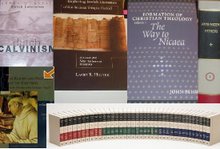
Ok...I have moved my blog to here: http://blahlog.wordpress.com
This is my last post here so update your Feeds and links!
Cheers,
CR
Ramblings from the life of Chris Rehers. Hence the name blah blah blog.

John Barach blogged today and said, "Remember when it was okay for Reformed writers to speak like this?" He then goes on to quote S. G. DeGraaf to challenge the meaning of Covenant of Works. As my research has shown the Covenant of Works has not always been constructed the way it is today among the non-FV'ers. However, as time has gone on the doctrine of the Covenant of Works gains "clarity" and receives its "mature" formulation.
Remembering when Reformed talked a certain way doesn't prove anything however or does it? Remember when it was ok to not have a fully worked out doctrine of the Trinity, redemption, etc? Remember when that was ok? However, now that time has gone on and those doctrines have been developed would it still be ok to talk as if they hadn't?
Would it still be ok to plop myself down in the early part of the 16th century when the imputation of Adam's sin, covenant of works, etc wasn't full developed and those things were even often denied? Is it ok to just plop ourself down anywhere in history and jump into the middle of a theological development and begin in the middle as if there hasn't been any work done?
Truly wondering.
 First Epistle of Clement A.D. 30-100
First Epistle of Clement A.D. 30-100


 Oxford has an extremely rich and diverse library service provided by over one hundred libraries. There are major research libraries, libraries attached to the faculties, departments and other institutions of the University, and college libraries.
Oxford has an extremely rich and diverse library service provided by over one hundred libraries. There are major research libraries, libraries attached to the faculties, departments and other institutions of the University, and college libraries. Interesting fact:
Interesting fact:Until fairly recently, before being granted access to the library, new readers were required to speak aloud the declaration printed below. This oath is now printed on the application form readers must sign in order to obtain their ticket:
I hereby undertake not to remove from the Library, nor to mark, deface, or injure in any way, any volume, document or other object belonging to it or in its custody; not to bring into the Library, or kindle therein, any fire or flame, and not to smoke in the Library; and I promise to obey all rules of the Library.
Thank you once again for going to the library and remember BOOKS ARE COOL!!!
 When we do the Twoth.com interviews we always ask what the person's favorite quote is. Well I think I found one of my own! "give 'em Watts, boys!"
When we do the Twoth.com interviews we always ask what the person's favorite quote is. Well I think I found one of my own! "give 'em Watts, boys!"  I found this while reading a fellow blogger's site. Good stuff.
I found this while reading a fellow blogger's site. Good stuff.“A few churches still take seriously the doctrine of the covenant as it relates to the children of believers, baptize these children because they’re in covenant, and actually count them as members of the church. Those churches insist, and rightly so, on their being full members” (R. B. Kuiper, The Glorious Body of Christ, p. 210).


Next comes the Divinity Library housing:






I'm finally going to listen to the 2005 AAPC on NPP debate between Rev. Dr. Gaffin and Rt.Rev.Dr. N.T. Wright. I got the nice looking CD package right here in front of me...should be some good stuff.
If there remains any more time I would like to cut into another CD package I got - Great Deliverance The Life of Justification with Leithart, Lusk, and Wilson - although I might have to put that off until next week.
Sure is great not being a tv-watching sportsfan...I get more time to waste doing other things like my line-up for the weekend =)
Cheers,
Chris




Get it HERE!!!





History of American Presbyterianism
The Tid Bits (Part I)
Sent to America in 1683 by the Irish Presbytery of Laggan, Rev. Francis Makemie was the chief promoter of an American presbytery. He was later arrested for preaching in a private home without a license for doing so.
Education for ministry early on:
From its foundations in American soil, Presbyterianism has always maintained an educated pulpit, a traditional Scottish ideal of a learned minister. This was held to without waver even in times of great shortage of preachers. This is amazing to think about in today’s climate. David Evans was one such man who was forbidden to continue to preach until he was sufficiently grounded in the original languages and in theology. In fact, concerning Mr. Evan’s preaching prior to education it was said of his action, “it was unanimously agreed that the said Evan had done very ill, and acted irregularly thus invading the work of the ministry, and was thereupon censured.” Mr. Evans did go on to receive training and education and was properly ordained to minister as a Presbyterian in November of 1714.
Order of worship in the early days:
Rev. James Anderson refers to using the Scottish Directory which is the earliest evidence of how they ordered worship in church service. The Presbytery – Growth:
By 1716 the Presbytery was growing and could now be divided into four presbyteries according to geographical locale and one collective meeting yearly, the General Assembly. High influx of Scotch-Irish immigrants began to pour into America. Many of which lived profane lives and the new frontier of America was a licentious playground for them. The Presbytery was not exempt from such and had to establish courts to deal with such among its own ranks.
Adoption Act:
I was surprised to discover that the early American Presbyterian Church didn’t have an adopted confession of faith. Though many acknowledge the WCF as their creed is was still only held in general and not a document that was officially adopted.
Then the question is raised: What is a church without a creed?
Reason given to adopt the WCF:
The Adoption Act of 1729. The WCF is adopted by the early American Presbyterian Church. No infallibility is claimed of the Westminster Divines. Each minister is able to state his own scruples with the WCF.
*Clippings from my notes crammed together. Sorry no footnotes and I haven't gone back to edit them to make sure everything is without grammatical errors...these are here for friends and family. My notes are taken from The Presbyterians by Randall Balmer and John R. Fitzmier and The Presbyterian Enterprise Edited by: Maurice W. Armstrong, Lefferts A. Loetscher, and Charles A. Anderson. Some notes may also be added from Dr. Andrew Hoffecker's class currently being taught at RTS Jackson, MS on History of American Presbyterianism.





